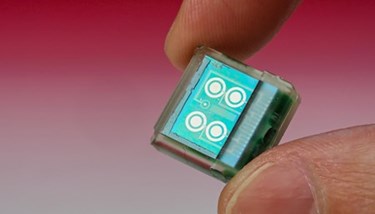Tiny, Implantable Chip Could Monitor Blood, Send Data To Smartphone

A new wireless biosensor placed just under the skin could offer weeks of continual blood analysis and communicate the results directly to a smartphone. If successfully developed, the device could take the place of invasive and inconvenient blood tests, and offer doctors a real-time assessment of how a drug is performing.
The device was developed at the Ecole Polytechnique Federale de Lausanne (EPFL) and was presented this week at the International Symposium on Circuits and Systems (ISCAS) in Lisbon by Sandro Carrara, a member of the EPFL research team.
The device operates autonomously and can monitor PH, temperature, and the levels of metabolism-related molecules such as glucose, cholesterol, or prescription drugs, Carrara stated in an EPFL press release. Measuring just one square centimeter, the silicon chip contains a circuit with six sensors, a control unit, and a radio transmission module.
An external battery, attached to the skin with a patch, wirelessly powers the device through an induction coil. The device can communicate with a smartphone through Bluetooth technology incorporated into the battery patch.
During his presentation, Carrara reported that experiments on mouse models conducted at the Institute for Research in Biomedicine in Bellinzona, Switzerland produced extremely promising results. Scientists were able to continually record levels of glucose levels and paracetamol (acetaminophen), in the implanted mice, whose daily activities were not hampered by intrusive wire trackers.
“Knowing the precise and real-time effect of drugs on the metabolism is one of the keys to the type of personalized, precision medicine that we are striving for,” said Carrara.
Because the preclinical testing was so successful and the device is minimally invasive, researchers believe that they could move the chip into human clinical trials within the next two to five years.
This is only the latest in a virtual tidal wave of portable medical monitoring devices introduced in recent years. An IHS report projects that the global market for wearable devices will hit $6 billion by 2016, and each new product is growing in complexity and versatility. While most new products will be marketed toward sports and fitness, the report indicates that a growing number of devices will be developed and sold for continuous medical monitoring.
Anthony Turner, a professor and research scientist at Linköping University, recently presented at the Elsevier’s 4th International Conference on Bio-sensing Technology and introduced a credit card-sized sensor capable of analyzing blood and saliva samples. According to Turner, new innovations in biosensors signal the start of a new era in medicine.
“We’re on the cusp of an entirely new era—not just for bio-sensing, but for measurements in healthcare and diagnostics,” said Turner. “Until now, we have been used to going to a doctor, who endows us with some wisdom and retains information about us and then waiting to see if we get better. Modern sensors and telecommunications are rebalancing this power; in the future, patients could have the information while physicians provide the service.”
